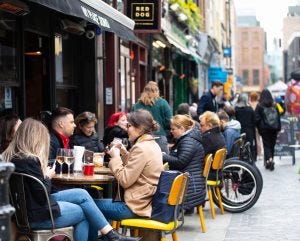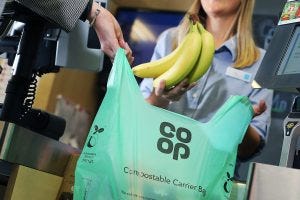Footfall West End peak since reopening. Co-op calls for Government to help combat plastic carrier use

Photo credit: David Parry/PA Wire.
Shaftesbury, the Real Estate Investment Trust which invests exclusively in the liveliest parts of London’s West End, has seen footfall return to 86% of the peak in December in 2020, just before London was placed into the third lockdown.
Footfall has continued to build across the area following the reopening of non-essential shops, restaurants, cafes and bars on Monday 12 April. The Company expects this trend to continue in the weeks and months ahead as office workers, a vital part of the West End’s economy begin to return to the area and, with indoor hospitality expected to be permitted from mid-May, increasing numbers of visitors being able to return to the area’s world-famous hospitality offer.
To support the reopening, al fresco seating has been introduced across Carnaby, Chinatown, Fitzrovia, Seven Dials and Soho for over 3,000 people to provide safe, comfortable all-day dining opportunities for groups of up to six people, all while observing social distancing guidelines, bringing buzz and activity to the West End as people return to enjoy their favourite restaurant, bar or café.
Brian Bickell, CEO, commented:
“It has been heartening to see people returning in large numbers to our iconic streets over the past week, in a safe and secure manner. The West End is beginning to feel alive once more, which has been made possible by the commitment that our partners and local businesses share with us to kickstart its recovery. Now as we approach the next milestone, it is important that this momentum is maintained to ensure this positive start to the easing of lockdown is sustained.”
Co-op calls for Government to help combat plastic carrier use

Co-op will remove plastic bags for life from sale in all 2,600 stores warning that the low-cost, reusable bag has become the new single-use carrier. The announcement comes as it publishes a new report ‘Bag to Rights’ which sets out new policy recommendations for Government.
As part of this move, and ahead of the new carrier bag levy increase coming in to place, the convenience retailer will also roll out compostable carriers to all stores to ensure that customers are able to purchase a low-cost, low impact alternative bag with a sustainable second use.
Co-op hailed the introduction of the carrier bag charge in 2015 and has welcomed the rise in the fee to 10p. However, as stated in Co-op’s latest report, it is now urging Government to go further in the next phase of its plans and is calling for a policy to require major retailers to report on all reusable bags, as well as single-use bags, to provide greater transparency to track the true impact of carrier bag levy.
Co-op’s other recommendations include requiring all single-use carrier bags to be certified compostable and to introduce a minimum 50p price for reusable bags to create a greater perceived value to encourage customers to reuse them instead of treating them as single-use.
Co-op praises the success of the levy’s ability to reduce the sale of conventional single use carriers significantly, seeing a 95% reduction since its introduction in 2015. However, data from Greenpeace has indicated that, in 2019, supermarkets distributed over 1.5 billion bags for life — weighing a total of 44,913 tonnes — which is a 56 percent increase from the previous year.
Bags for Life use more plastic in their production than conventional single use carriers, which has in turn increased the amount of plastic in circulation. Co-op’s new initiative will remove 29.5 million bags for life, weighing around 870 tonnes of plastic, from sale each year.
The convenience retailer is now looking to work with more food retailers to adopt a balanced and joined-up approach to their carrier bag offer. Co-op’s approach involves removing bags for life from sale, rolling out a compostable bags for 10p and setting the price of its lowest cost reusable bag at 50p. This approach is aimed at embedding real reuse of bags in the retail setting.
The replacement of single-use bags in all Co-op stores with its iconic certified compostable carrier bag, means that when customers forget their reusable bag, or just need an extra bag on a shopping trip, there is a low-cost option available that has a built-in and very valuable second use. Currently only one other retailer offers a lower-price point bag alternative to a bag for life. Perhaps unsurprisingly, faced with limited options, many customers are simply choosing the cheapest bag available, which in many cases is a bag for life.
Jo Whitfield, CEO, Co-op Food, said: “Increased use of Bags for Life has led to a sharp rise in plastic use. With over 1.5 billion bags sold each year by retailers, this remains a massive issue for our industry as many shoppers are regularly buying so called ‘Bags for Life’ to use just once and it’s leading to major hike in the amount of plastic being produced.
“To help tackle plastic pollution and the use of unnecessary plastic, we will be ceasing the sale of Bags for Life when current stocks are exhausted. We’re also ensuring all of our members and customers have access to a low price point option that’s more environmentally friendly, alongside more durable bags at a higher price point.
“We believe that it should be mandatory for all retailers to report on the sales of all of their reusable bags, not just single-use bags. Right now, Co-op is the only major retailer to report on all of the bags it sells. This policy would enable a fuller understanding on the impact of the levy and its true effect on shopping behaviours when customers are making decisions at the tills.”
Co-op became the first retailer to make compostable carrier bags widely available when it rolled them out to over 1,000 stores in 2018. The bags are certified compostable and are used as food waste caddy liners in the home and collected as part of Local Authority household food waste collections. The bags are also suitable for use in home-compost bins. With the ongoing expansion of kerbside collections across Local Authorities in the UK, this is the right time to make the bags available in all stores. The move also promotes increased engagement with food waste collections, which is why Co-op is also recommending that all single-use carrier bags must be compostable, at a minimum price of 10p wherever sold.
Reducing the environmental impact of its products has always been at the core of Co-op’s activities. It removed plastic stems from cotton buds before any other retailer 14 years ago, banned microbeads and removed all hard to recycle black and dark plastic from its shelves. Co-op is on track to make all of its own-brand packaging easily recyclable this year.
source https://klinkerbud.medium.com/footfall-west-end-peak-since-reopening-cd1161d89a7f?source=rss-8a287f9546ea------2
Немає коментарів:
Дописати коментар